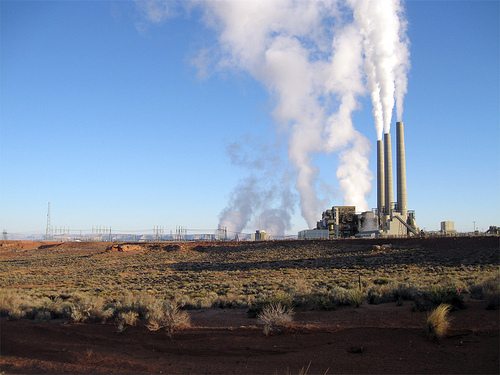

Environment
Climate change: it’s time for the communications industry to pick a side
In a time of moral crisis and a battle for hearts, rather than minds, the communications industry must end its relationship with the climate change denial lobby, writes Kirsty Schneeberger.
“The hottest places in hell are reserved for those who in time of moral crisis preserve their neutrality,” said JFK, interpreting the Third Canto of Dante’s Inferno.
Gripped in a moral crisis of such epic proportions, as we are in relation to climate change and fossil fuel based economic systems, we must ask ourselves “who is preserving their neutrality?” Mired in the deep-rooted politicisation of a systemic failure many of us have impotently borne witness to; the fight over data, scientific facts, moral and economic rationalization, and – ultimately – semantics, play out on the world’s stage.
We align ourselves with the scientists we trust, the politicians who represent our views, those papers that tell the story we want to believe in. But whose side of the story are we most exposed to? How do we determine whether or not we can trust a source?
There are those who patiently produce graph after graph, believing that a rational mind will understand it for what it is. That we will be able to interpret detailed analysis for ourselves and form conclusions that will satisfy our thirst for understanding.
The reality is, however, that any word to support or any morsel of evidence to justify our own position is pounced upon and heralded as being the truth. Forget the graphs and analysis, forget the rational argument and logical conclusions drawn, this is a battle of hearts, not minds.
Out there in the digital landscape we have access to all the information we could ever need to develop an informed opinion, but access isn’t the issue, representation, or rather misrepresentation, is.
With big PR companies being employed not to promote the truth, but to peddle the views of the highest bidders, a multi-billion dollar industry has grown up around the ‘communications’ of climate change.
In focusing on fees and selling their services to those who can pay, has the communications industry maintained a morally neutral position, or have they inadvertently picked a side by default? Have they been hiding behind their ‘independence’ in order to promote the views that best align with themselves and their profits?
In failing to consult a moral compass on the issue of climate change, they have also failed to recognize that the service they provide is helping to promote views that go against society’s best interests. They are promoting misinformation that doesn’t necessarily prevent people from having access to unbiased information; rather it skews the debate by using its powers of persuasion to muddy the waters and make it even more difficult for the general populace (not to mention politicians) to reach an informed view.
In his poem The Second Coming, Yeats writes that “The best lack all conviction, while the worst / Are full of passionate intensity.”
It is not so much that the ‘best’ – those who are earnestly trying to promote a fair side of the story – lack conviction. It is perhaps that they have neither had the resources to call on PR companies to promote their messages; nor have they had a willingness to engage in deploying ‘spin’ tactics.
And rightly so. As soon as there is even a whiff of ambiguity relating to scientific issues, climate deniers and the biased press leap upon it, blowing its relevance out of all proportion, leaving the grains of truth hidden in the wake of a non-scandal.
But that’s not to say the balance cannot be tipped in favour of those promoting the messages that we need to hear. This week’s revelation of PR companies refusing to work for climate deniers is just one way (of many) in which we can combat the promotion of misinformation.
Thanks to the work of the Climate Investigations Centre we now know that 25 of the world’s top PR companies have taken a stand against climate deniers. No longer will climate denialism be given the megaphone it has so desperately relied on.
This is one of the most important steps in tackling the insidious influence that climate deniers have enjoyed over the past few decades, whilst others have tried in earnest to keep the debate ‘clean.’
Whether they were neutral or not before, the PR and communications industry is finally catching up with the likes of Futerra and Nice and Serious, and taking a side – the good side. In this time of moral crisis they have saved themselves a few degrees of eternal heat: Mephistopheles will be most displeased to have lost out on such promising clients.
Kirsty Schneeberger is a co-founder of Beautiful Corporations, a sustainability engagement and communications consultancy. She previously worked for the Stakeholder Forum, leading the UN engagement work on sustainable development in London and New York.
Take our 2014 reader survey and you could win an iPad, Kindle or donation to a charity of your choice.
Further reading:
Top PR firms rule out working with climate deniers
US billionaire Tom Steyer to launch $100m campaign against climate deniers
BBC tells journalists to cut airtime for climate change deniers
Sir Richard Branson says climate deniers should ‘get out of the way’
Prince Charles attacks ‘headless chicken’ climate change deniers


 Environment12 months ago
Environment12 months agoAre Polymer Banknotes: an Eco-Friendly Trend or a Groundswell?

 Features11 months ago
Features11 months agoEco-Friendly Cryptocurrencies: Sustainable Investment Choices

 Features12 months ago
Features12 months agoEco-Friendly Crypto Traders Must Find the Right Exchange

 Energy11 months ago
Energy11 months agoThe Growing Role of Solar Panels in Ireland’s Energy Future






























